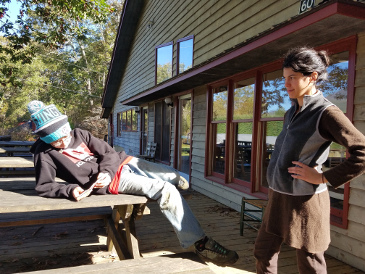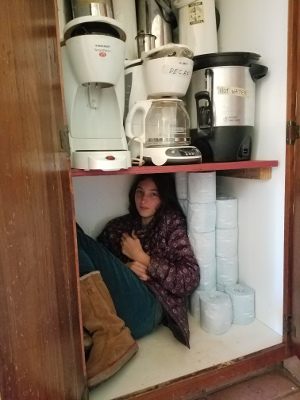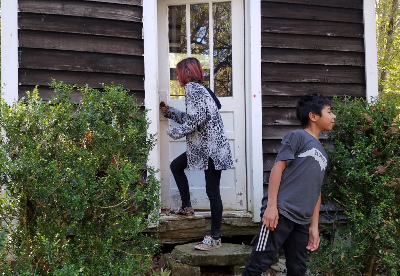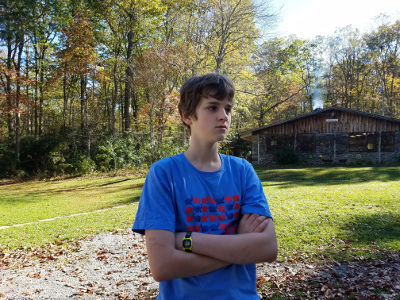How to Manage Teenage Rebellion and Turn it into Growth

Leaf season is always a special time. Thousands of people flock to the Blue Ridge Parkway in these few precious weeks of October to see the mountains transform in a collage of canary yellow, sunburnt orange, and rusty red. It’s an annual cycle that lets us know the final harvest is here and it’s time to start preparing for the cold.
Life is cyclical. We tend to like it that way. We like knowing what is ahead of us so that we can prepare for it. We like knowing that whatever troubles we are facing in the present, others have faced them before and still others will face them again. Being part of a cycle makes us feel like we are part of something larger than ourselves.
Feelings Right on Schedule
 This is why every year at the start of school I pull Arthur Morgan School’s new staff aside and introduce them to the calendar. We talk about all the events we do each year and how they can best prepare for them. We also talk about they are going to feel. In the first weeks of school I tell them they will experience great joy as they watch our community bond. In November, as we prepare for Thanksgiving, they will be running frantically from one task to the next, barely acknowledging anyone in their path. By February, they will wonder why they ever came to work at this remote school in the mountains, but in the warmth of April they will remember and love everyone around them once again.
This is why every year at the start of school I pull Arthur Morgan School’s new staff aside and introduce them to the calendar. We talk about all the events we do each year and how they can best prepare for them. We also talk about they are going to feel. In the first weeks of school I tell them they will experience great joy as they watch our community bond. In November, as we prepare for Thanksgiving, they will be running frantically from one task to the next, barely acknowledging anyone in their path. By February, they will wonder why they ever came to work at this remote school in the mountains, but in the warmth of April they will remember and love everyone around them once again.
Knowing When Feelings will Occur is Power
I call it their emotional calendar, and since I started telling new staff about it I’ve witnessed a change. Instead of panicking and looking for new jobs in February, like I did when I first started working at AMS, these new staff are able to recognize they are not alone. They are experiencing something all staff go through. They know they can look forward to the peace and happiness ahead of them in the Spring.
Teenagers have an emotional calendar as well. Throughout the year there will be moments of stress and anxiety. Other times they will be carefree and relaxed. Knowing a students’ emotional calendar helps teachers prepare and create space for the volatile emotions their students will face. Instead of reacting moment to moment to our middle schoolers’ changing feelings, we can help guide them knowing that a new emotion is just around the corner.
The Great October Teenage Rebellion
 Right now we are in October. For the middle schoolers of AMS this means the honeymoon period is over but the stress of Thanksgiving prep week is still far in the future. It’s a time when school no longer feels new and life falls into a sort of day-to-day routine. In other words, it’s the perfect time for a teenager to rebel!
Right now we are in October. For the middle schoolers of AMS this means the honeymoon period is over but the stress of Thanksgiving prep week is still far in the future. It’s a time when school no longer feels new and life falls into a sort of day-to-day routine. In other words, it’s the perfect time for a teenager to rebel!
To new staff, I characterize October as the month when students start pushing boundaries. No longer worried about making a good impression, our students turn their attention to seeing just how far they can push the rules. They complain about work projects; they duck out of chores; they play sick and find every excuse they can not to do their homework. For staff members not expecting it, this time of rebellion can be stressful. For the prepared staff member, it can be an opportunity to generate growth.
Meeting Rebellion with Compassion
When students rebel, the common response for teachers is to push back. A power struggle ensues and the student usually ends up facing consequences. Moments like these typically breed resentment and feelings of competition over who will win and who will lose. At Arthur Morgan School we try a different approach: patience. Rebellion is developmentally appropriate for teenagers. They are supposed to push boundaries and test limits. It is part of how they determine their personal morals.
 Students who avoid homework or push back while doing chores are usually reacting to an unmet emotional need. It might be a desire for attention. They may be feeling homesick. Perhaps their confidence toward schoolwork is really low. A lot of times the students don’t even understand how they are feeling. Some of them want to talk about it. Some of them don’t. It can be very frustrating and confusing for teachers who have to respond to all these different needs, and it’s completely normal for them to lose perspective and think this stressful time might go on forever.
Students who avoid homework or push back while doing chores are usually reacting to an unmet emotional need. It might be a desire for attention. They may be feeling homesick. Perhaps their confidence toward schoolwork is really low. A lot of times the students don’t even understand how they are feeling. Some of them want to talk about it. Some of them don’t. It can be very frustrating and confusing for teachers who have to respond to all these different needs, and it’s completely normal for them to lose perspective and think this stressful time might go on forever.
Turning Rebellion into Growth
 If teachers accept rebellion as appropriate behavior instead of something to eliminate, they are able to react to it with understanding and compassion. The prepared teacher might ask a rebellious student about the emotions that led to their actions. They will see through the actions the student is using to mask their shame. The teacher can then help a student face the natural consequences to their actions instead of putting on authoritative consequences that only create more embarrassment and shame.
If teachers accept rebellion as appropriate behavior instead of something to eliminate, they are able to react to it with understanding and compassion. The prepared teacher might ask a rebellious student about the emotions that led to their actions. They will see through the actions the student is using to mask their shame. The teacher can then help a student face the natural consequences to their actions instead of putting on authoritative consequences that only create more embarrassment and shame.
That is why knowing students’ emotional calendar is so powerful. By the end of October most of our students have worked through their desire to rebel. Memorizing lines for the school play, getting portfolios ready for Open House, and prepping the campus for Thanksgiving shifts their focus toward other projects and worries. The calendar continues and the next cycle of feelings begins. By handling this time period with patience and understanding, both staff and students are able to make it through with less stress and more peace of mind. They might even find a moment to notice the changing, colorful leaves.
-by Nicholas Maldonado
For more information on how AMS can you manage your own teenage rebellion
Contact Us
